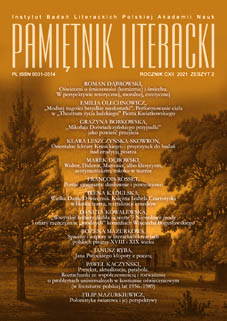Postać emigranta: dosłownie i powieściowo
The Figure of Émigré: Literal and Novelistic Meaning
Author(s): François RossetSubject(s): Language and Literature Studies
Published by: Instytut Badań Literackich Polskiej Akademii Nauk
Keywords: émigré;emigration;18th century;the French Revolution;the Kościuszko Uprising;Poland;France;
Summary/Abstract: The author of the paper analyses the evidence for the appearance of the word émigré in the French language and the changes of its scope of meaning. Initially, this word referred to a person, mostly an aristocrat, who escaped from France in the times of the French Revolution. With time, the lexeme started to be used to name a person forced to leave their home country oppressed by a military and political force, a defender of freedom that represents various social strata. The change took place mainly as a result of the Polish experience of the end of the 18th century—the Kościuszko Uprising and partitions of Poland. The lexical perturbations were accompanied by a revision of the French people’s attitude towards Poland and Poles. The French attention was captured by weirdness of country system and geopolitical situation, but also by devotion, heroism, high ethics, and love for freedom. The direction of the changes is confirmed by the French novel writings of the times.
Journal: Pamiętnik Literacki. Czasopismo kwartalne poświęcone historii i krytyce literatury polskiej
- Issue Year: 112/2021
- Issue No: 2
- Page Range: 79-87
- Page Count: 9
- Language: Polish

